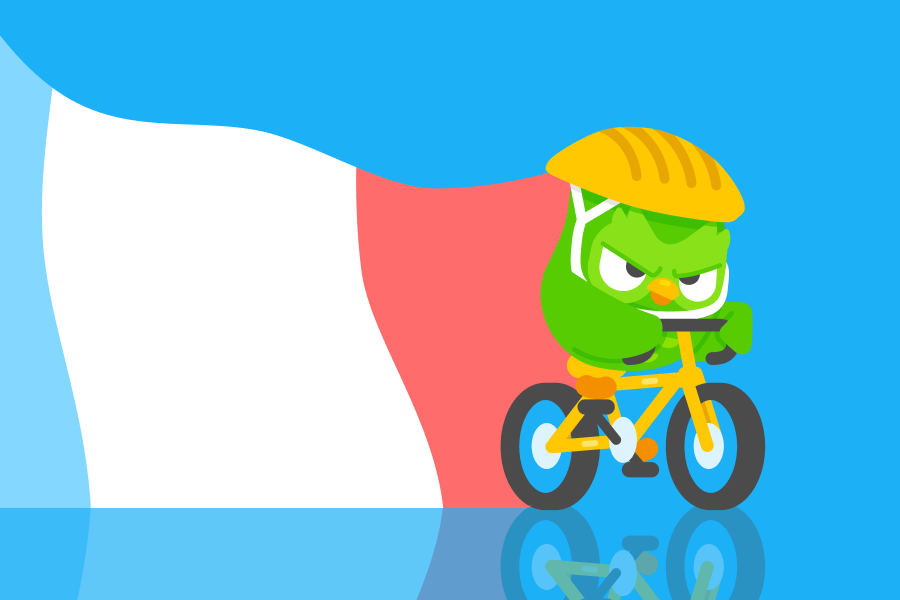This month is the Tour de France, and Duolingo is celebrating with our own “Tour de French Learning”! We’re exploring everything from the history of French, to what French accent marks mean, to who uses French around the world! This is the last stage of our tour, so read on to earn your yellow jersey in French!

Alors, mes amis… Duolingo’s Tour de French Learning is coming to an end! You might remember from my post about the history of French that French is used around the world and its dialects can be really different! For our last stage of this learning tour, let’s cycle through some French dialects.
Parisian French
This variety, also known as Standard European French or Metropolitan French, is considered the prestige form of French used in France, and is the one you are likely to learn in the classroom. Parisian French emerged as the standard variety of French on account of Paris’ central geographical location within France and its political and cultural prestige.
- Pronunciation: Most Parisian French speakers no longer pronounce the sounds [e] (like in English “mate”) and [ɛ] (like in English “met”) differently when they appear at the ends of words. (Do you recognize those symbols from the International Phonetic Alphabet?) This means that there is no longer a difference in pronunciation between the future tense and the conditional tense in many verb forms. For example, in Parisian French je ferai (I will do) and je ferais (I would do) are pronounced the same. How do people tell them apart then? Mostly context, but even experienced speakers often confuse the two in spelling!
- Grammar: When using the negation ne…pas, which wraps around the verb like in je ne mange pas (I don’t eat), the ne is often dropped in spoken language: je (ne) mange pas. Whether or not the ne is pronounced is influenced by level of formality and how quickly someone is speaking, among other factors, but in most spoken language, it is now regularly omitted.
- Language and gender: Standard French has been slow to accept the usage of feminine forms for profession names, even though such forms have been in use in Quebec French since 1989. These newer feminine forms include professeure (woman professor), ingénieure (woman engineer), présidente (woman president), cheffe (woman boss), etc. It wasn’t until 2019 that these forms were finally deemed acceptable by the French Academy in France, a language protection society that seeks to minimize linguistic change from outside forces.
Quebec French
Quebec French (QF) is the predominant variety of French spoken in Canada. It’s based on the French spoken in Paris during the 17th and 18th centuries. During that time, Europeans were colonizing the Americas, and French royals sent Parisians to live in la Nouvelle France (New France) which is modern-day Quebec. Once in Quebec, the Parisian French that had been brought over evolved differently from the French back in Paris because it was in contact with different Amerindian languages and English in the surrounding community.
- Pronunciation: The sounds “t” and “d” are pronounced as “ts” (sort of like the “zz” in English “pizza”) and “dz” (like at the end of “buds” in English) when they’re in front of the letters “i” and “u.” So, petit (little) gets pronounced as petsi and mardi (Tuesday) as mardzi.
- Grammar: Informal QF often uses ‑tu placed after the conjugated verb to mark questions that can be answered with “yes” or “no,” like T’as-tu fini ? (Have you finished?).
- Local slang: While traveling in Quebec, you’ll hear many words with localized meanings such as un chum (a friend or boyfriend), un char (a car), un dépanneur (a convenience store) and magasiner (to shop). Some of these words also exist in Standard European French with completely different meanings. For example, un char means “a chariot” in France and un dépanneur is “a mechanic,” which can sometimes create some comical misunderstandings across dialects!
Ivoirian French
Ivoirian French is an official language in Ivory Coast (Côte d’Ivoire) in West Africa. French was brought to Ivory Coast via colonization beginning in the late 19th century. It is still taught in schools today and serves as a lingua franca alongside Dioula, an indigenous language spoken in Ivory Coast and in nearby Burkina Faso and Mali.
- Pronunciation: The characteristic French [ʒ] sound (like the “zh” sound in English pleasure—a word that comes from French!) is often pronounced as a “z” or “y” sound in Ivoirian French, giving words like je (I) a pronunciation of “zuh” or “yuh.”
- More pronunciation! In Ivoirian French, big groups of consonants aren’t allowed. In Standard French, parce que (because) is pronounced with the three consonant sounds “rsk” all together, sort of like parske. Not all languages allow so many consonants in a row, and Ivoirian French simplifies the pronunciation to paske or pake.
- Borrowings: This variety of French contains many borrowings from indigenous languages in the area like Dioula and Mooré, including woro-woro (communal taxi) and ligid (money).
Swiss French
Romandy is the name for the francophone part of western Switzerland where Swiss French is spoken. This region borders east-central France and was once home to Franco-Provençal, one of the three dialect zones in present-day France. Use of French increased gradually in the country, with the Franco-Provençal dialects taking hold and expanding throughout Switzerland at the beginning of the 19th century. In 1848, with the foundation of the Swiss Confederation, French was recognized as an official language in Switzerland alongside German and Italian.
- Pronunciation: Swiss French speakers have a reputation of speaking more slowly than French speakers from France (at least 6% slower and up to as much as 20%!), but the most noticeable difference is actually in where they put the emphasis in their words and phrases. In Standard French, it is the last syllable of words and phrases that receives this emphasis, or stress, so “hi” and “bye” get pronounced bonJOUR and saLUT. However in Swiss French, it is the second-to-last syllable that receives the stress, which instead yields BONjour and SAlut. This difference leads listeners to perceive Swiss French as more “sing-song”!
- Grammar: Y is often used to replace object pronouns le or la (when they mean “him,” “her,” and “it”), in speech, so you’ll hear Si tu y fais, fais-y bien !
- Counting: Swiss French uses a base-10 counting system for numbers, so “seventy” (7X10) is septante, “eighty” (8x10) is huitante, and “ninety” (9x10) is nonante, while Standard French uses a base-20 system for these forms: quatre-vingts “eighty” (4x20), quatre-vingt-dix “ninety” (4x20+10), etc.
Reunion French
Reunion French (RF) is spoken on the island of Reunion in the Indian Ocean, to the east of Madagascar and the southwest of Mauritius. The island of Reunion was occupied by the French from the 1640s to 1946, when it was granted the status of Overseas Department of France.
- Pronunciation: The “r” sound in RF has changed over time and is now pronounced like “w,” as in [w]ouge “red” and [w]aison “reason.”
- Liaison: Reunion French has almost no remaining liaison! This means that les amis “the friends,” pronounced “layz amee” in other varieties of French, is instead pronounced “lay amee” with no connecting “z” sound between the words.
- Borrowings: There are lots of unique words in RF that come from other languages, like Malagasy, Hindi, Portuguese, Gujurati and Tamil, which mixed in Reunion on account of its location on the Europe-Asia trade route. Some examples include shabouk “whip,” bibe “smile,” and kamaron “shrimp, gambas.”
And now, a message from our Tour de French Learning sponsor, Duolingo!
Thank you for joining us!
Nous sommes arrivé.e.s ! (That’s one of the ways to show gender inclusivity in some dialects of French!) You’ve made it to the Champs-Élysées, the final stage of our Tour de French Learning. We’re so glad you joined us to learn about French and find new ways of connecting with this global language. To relive the memories and keep practicing, you can find all the stages here:
A celebration of French
From the Gauls to globalization: The history of French
Dear Duolingo: How do you know what sounds French letters make?
What do French accent marks mean?
6 unique words to help you learn about French culture
The good news about this “race” is you don’t have to wait a year to cycle through these posts again, or keep up with your French practice! We’ll be here for you any time you have questions about French dialects, pronunciation, grammar… and we’ll keep publishing new posts on the Duolingo blog to help you along your learning journey. In the meantime, do a lesson, check out the French podcast, and tweet us at Duolingo to let us know which stage of the tour was your favorite!
We’d like to thank our colleagues and guest contributors who helped us compile this series:
Dr. Sharon Wilkinson
Dr. Lisa Bromberg
Dr. Amanda Dalola
